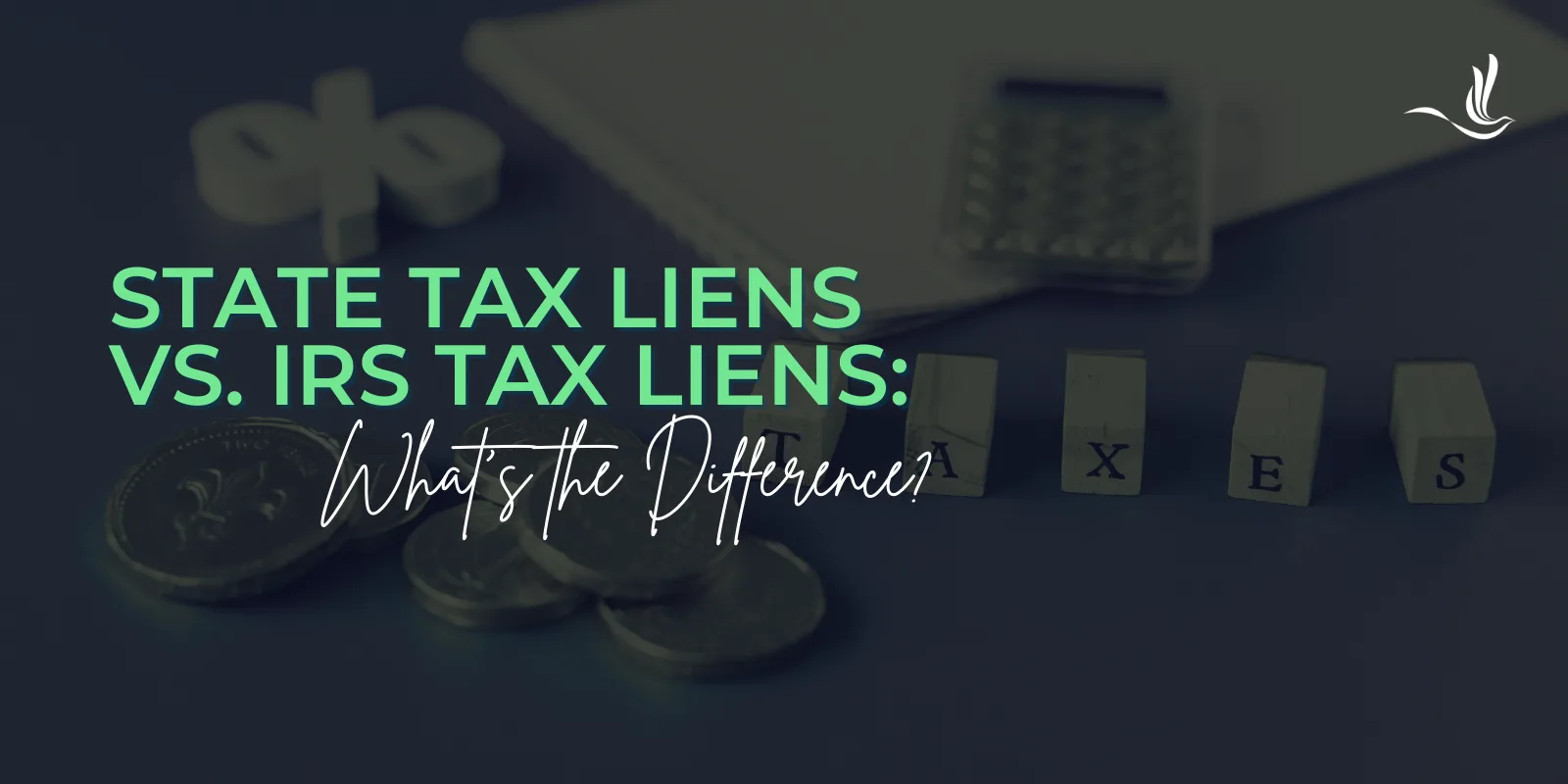Key Takeaways:
- State tax liens vary widely in how they’re enforced and resolved, while IRS tax liens apply nationwide and follow standardized procedures.
- You can have both types of liens simultaneously if you owe taxes at both the state and federal level.
- IRS tax liens no longer appear on credit reports, but state tax liens may still impact your credit and public record.
- IRS liens are often more predictable to remove through payment plans or Offers in Compromise, while state liens can be more complex to remove and depend heavily on the laws of the issuing state.
- Ignoring either lien can result in serious consequences, including wage garnishments and asset seizures.
- Both types of liens can block property sales, refinancing, or new loans until resolved.
Understanding tax liens is essential for anyone who owes taxes, whether to the federal government or a state taxing authority. A lien can have serious implications for your finances and even your ability to sell or refinance property. While the term “tax lien” is often used broadly, not all tax liens are the same. There are significant differences between state tax liens and IRS tax liens. Knowing how each one works can help you manage your tax obligations and protect your assets. In this article, we’ll break down the key differences between state tax liens vs. IRS tax liens, how they’re issued, what they mean for your property and credit, and how you can resolve them.
What Is a Tax Lien?
At its core, a tax lien is a legal claim made by the government against a taxpayer’s property due to unpaid taxes. It acts as a security interest, meaning the government is asserting its right to your assets until your debt is paid. This lien can affect real estate, personal property, and even financial assets like bank accounts.
Tax liens are not the same as levies. A lien is a claim, while a levy is the actual seizure of property. A lien comes first and warns the taxpayer that collection actions could follow. Both the federal government and individual states have the authority to file tax liens, which brings us to the distinction between state tax liens and IRS tax liens.
IRS Tax Liens
When a taxpayer fails to pay federal taxes, the IRS has the authority to file a lien against that person or business. This is known as a federal tax lien, and it is governed by strict rules and timelines.
When Does the IRS File a Tax Lien?
The IRS will not file a lien the moment taxes are unpaid. First, it will assess the tax and send a notice and demand for payment. If the taxpayer does not respond or pay, the IRS may file a Notice of Federal Tax Lien (NFTL). This is a public document that alerts creditors and other interested parties that the IRS has a legal claim to the taxpayer’s property.
Once the NFTL is filed, the lien attaches to all of the taxpayer’s current and future property. This includes homes, cars, bank accounts, business equipment, and anything else of value. It can also attach to any property the taxpayer may acquire later. For example, if you receive an inheritance or purchase a vehicle after the lien is filed, the lien could apply to those assets as well.
What Does an IRS Tax Lien Do?
An IRS lien does not result in immediate seizure of property. However, it can significantly impact a taxpayer’s ability to borrow money, sell property, or refinance a mortgage. The presence of a federal tax lien often causes lenders to deny credit applications or impose stricter terms.
How Do I Remove an IRS Tax Lien?
To remove a federal tax lien, the taxpayer must generally pay the full amount owed. However, there are other options, including subordination, which allows a lender to move ahead of the IRS in priority, and withdrawal, which removes the public record of the lien, even if the debt is not fully paid under certain conditions. In some cases, taxpayers may also qualify for an Offer in Compromise to settle their debt for less than the full amount owed.
State Tax Liens
States have their own taxing authorities, such as the California Franchise Tax Board or the New York State Department of Taxation and Finance, and they also have the power to issue tax liens. While the concept is similar to that of a federal lien, state tax liens are governed by state law, which means procedures can vary widely.
When Do States File a Tax Lien?
A state tax lien is typically issued when an individual or business owes unpaid income tax, sales tax, payroll tax, or other state-imposed taxes. Just like the IRS, a state will first assess the tax and notify the taxpayer of the balance due. If the taxpayer fails to respond or resolve the debt, the state may file a tax lien with the appropriate agency—often at the county recorder’s office or the Secretary of State.
What Do State Tax Liens Do?
One key difference is that each state has its own enforcement mechanisms and timelines. For example, California issues a State Tax Lien Notice that becomes a public record and attaches to property owned within the state. In Texas, where there is no state income tax, liens may arise from other obligations like franchise taxes or sales taxes for businesses.
Another major difference is that state tax liens may be filed at the county level, meaning the lien is public within that jurisdiction. This can complicate matters if a taxpayer owns property in multiple counties or states. As with IRS tax liens, a state tax lien can hinder your ability to sell or transfer property. For instance, if you try to sell your home while a state tax lien is active, the lien will typically need to be resolved before the sale can proceed.
How Do I Remove a State Tax Lien?
Each state has different options for resolving tax liens. Some offer payment plans, while others allow for hardship waivers or settlement agreements. It’s important to understand your specific state’s policies, as there is no one-size-fits-all solution.
Key Differences Between State and IRS Tax Liens
Both federal and state liens serve the same basic function: securing payment of back taxes. However, there are crucial differences in how they operate and impact taxpayers.
Jurisdiction and Authority
Perhaps the most fundamental difference between state tax liens and IRS tax liens is jurisdiction. An IRS lien is federal and applies across the entire United States. This means that if you own property in multiple states or move to another state, the lien follows you.
A state tax lien, on the other hand, is generally limited to the jurisdiction of the state that issued it. If you owe taxes to the State of New York, that lien typically applies to property within New York. However, some states coordinate with others to enforce liens across borders, especially for business taxes.
Filing and Public Record
When the IRS files a Notice of Federal Tax Lien, it usually records the document with the local county clerk or recorder where the taxpayer resides or owns property. It may also file with the Secretary of State in certain situations, particularly for businesses.
States follow their own filing practices. Some, like California, file tax liens with the Secretary of State and with local county agencies. Others may only file at the county level, which can affect how easily the lien is discovered during a title search or credit review.
For example, if you live in Illinois and owe back taxes to the state, the lien may only appear in county records. However, if you try to get a mortgage, the lender’s title company will often discover the lien during their due diligence process.
Priority and Collection Power
A crucial aspect of any lien is priority—meaning who gets paid first if a taxpayer sells a property or files for bankruptcy. Generally, the rule is “first in time, first in right.” If the IRS files its lien before the state does, the federal government’s claim takes precedence. However, if a state files first, it may have priority, especially in that jurisdiction.
That said, federal law can sometimes preempt state laws, giving the IRS superior collection powers. The IRS also has broader tools at its disposal, such as levies on Social Security benefits and federal payments.
Variation in Enforcement
The IRS operates under a uniform set of rules across all 50 states, and its collection efforts are fairly standardized. In contrast, each state develops its own procedures, collection methods, and timelines. This creates a wide spectrum of enforcement aggressiveness.
Some states are highly proactive and pursue unpaid taxes quickly with liens, garnishments, and levies. Others have more lenient timelines or may take longer to initiate collection actions. For example, New Jersey is known for being aggressive in pursuing tax debts, while other states may offer longer grace periods before filing liens.
Credit Reporting
One often-overlooked difference in state tax liens vs. IRS tax liens is how they affect your credit. In 2018, the three major credit bureaus—Experian, Equifax, and TransUnion—stopped including IRS tax liens in consumer credit reports due to accuracy concerns. As a result, a federal tax lien no longer appears on most credit reports.
However, state tax liens may still show up, especially if a state reports them to public databases that are accessed by lenders. Some credit report providers also pull data from county records, which could include state tax liens. This means a state lien might still affect your credit score, even when an IRS lien does not.
How to Resolve Tax Liens
Whether dealing with a state tax lien or an IRS tax lien, prompt action is essential. Ignoring a lien can lead to more severe consequences, including wage garnishments, bank levies, or the forced sale of property.
Resolving IRS Tax Liens
For IRS tax liens, the most straightforward solution is to pay the debt in full. Once paid, the IRS will release the lien within 30 days. If you cannot pay in full, you can apply for an installment agreement or an Offer in Compromise. In some cases, you can request a lien withdrawal even while the balance remains, particularly if you’ve entered into a direct debit installment plan.
Resolving State Tax Liens
Resolving a state tax lien depends on the state. Some offer streamlined payment plans, while others require negotiation or proof of financial hardship. In California, for instance, the Franchise Tax Board may agree to release a lien after a taxpayer enters a payment agreement and demonstrates good faith.
Resolving IRS and State Tax Liens Simultaneously
In complex cases, such as when a taxpayer is dealing with both federal and multiple state liens, it may be advisable to consult with a tax professional. Enrolled agents, CPAs, and tax attorneys can help negotiate terms, identify lien priorities, and explore resolution strategies that minimize damage.
Frequently Asked Questions
Q: Do state tax liens or IRS tax liens affect your credit score more?
A: State tax liens may still appear on credit reports, while IRS liens typically don’t show up anymore. However, both can impact loan and refinancing applications.
Q: Which is harder to remove: a state tax lien or an IRS tax lien?
A: It depends, but in general, IRS liens are since they follow standardized removal processes. State lien removal varies and can be more complex depending on the state’s rules.
Q: How long do tax liens stay in place?
A: An IRS lien remains until it’s paid or it becomes unenforceable, usually 10 years. State tax lien durations vary by state. Some may expire, renew automatically, or be extended, depending on the state.
Q: Can I sell my home if I have a state or IRS tax lien?
A: Yes, but the lien must be paid at closing. If the sale won’t cover the debt, you may need a lien discharge or settlement.
Q: Does a state tax lien follow you if you move to another state?
A: Typically, the lien stays tied to property in the original state, but the state may pursue collection across state lines.
Tax Help with Liens
Understanding the differences between state tax liens vs. IRS tax liens is critical for protecting your property, your credit, and your financial future. While both serve the same fundamental purpose, their scope, filing processes, and enforcement mechanisms can differ significantly. If you’re facing a tax lien from either the IRS or a state, don’t delay. Taking control of the situation now could prevent more serious financial consequences down the road. Optima Tax Relief is the nation’s leading tax resolution firm with over a decade of experience helping taxpayers.
If You Need Tax Help, Contact Us Today for a Free Consultation
Publisher: Source link











